Don Coram
CaterpillarsCount! (Citizen Science Service Code C254) is part of a multi-year, multi-site National Science Foundation-funded study to determine whether seasonal activity of plants, insects, and birds are all responding in the same way to climate change. The lead universities for the study are University of North Carolina, Georgetown University, and University of Connecticut. Figure 1 maps the 73 sites around the Eastern U.S. that collected data in 2018.
The paper that was the impetus for the project is “Increasing phenological asynchrony between spring green-up and arrival of migratory birds”, which appeared in Nature’s Scientific Reports, Vol. 7, in 2017. Phenology is a branch of science dealing with the relations between climate and periodic biological phenomena (such as bird migration or plant flowering). At each site, volunteer citizen scientists count caterpillars and other arthropods on a specific collection of 50 leaves on each of 10 trees during the growing season (May-August). (50 is an arbitrary number intended to be a balance between getting enough data and not creating an overwhelming data collection chore.) These counts will be repeated over several years to look for trends. With 73 sites, there is no way this data could be collected without citizen scientists, hence the participation of naturalists like us. Researchers at the universities analyze the data.
For the Fairfax County site, the selected trees are in the Walker Nature Center (WNC) in Reston. WNC Director, Katie Shaw, is the site manager. I am the lead data collector, assisted by two other FMN members, Kim Schauer and Claudia Thompson-Deahl. Elise Larsen of Georgetown University has been our point of contact with the national CaterpillarsCount! project.
In 2018, we conducted 140 surveys on 14 different dates, observing a total of 500 arthropods, including 13 caterpillars, which were present on 9.29% of surveys. (A “survey” observes the 50 leaves of one tree.) Nationally, the top 10 sites had caterpillars present in average of 5.32% of surveys, so our site looks good from this perspective.
One of the prettiest caterpillars we found was the American dagger moth caterpillar, Acronicta americana, shown in Figure 2. 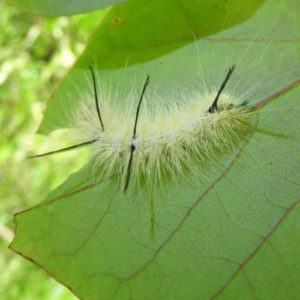 We also observed fall webworm moth caterpillars, geometer moth caterpillars, and others that we could not identify. Among the other arthropods we observed were debris-carrying lacewing larvae, daddy longlegs, beetle larvae, and sylvan jumping spiders.
We also observed fall webworm moth caterpillars, geometer moth caterpillars, and others that we could not identify. Among the other arthropods we observed were debris-carrying lacewing larvae, daddy longlegs, beetle larvae, and sylvan jumping spiders.
Because caterpillars are a major source of food for nestlings of migratory birds, we are especially interested in the timing of caterpillar availability. Caterpillar phenology (e.g., lifecycle events) at the WNC site is shown in the Figure 3. Caterpillar occurrence peaked at 36.36% of surveys on August 19. Note that August 19 is late to provide a food source for nestlings. My conjecture for this lateness is that the insects usually responsible for caterpillars in the spring are becoming rarer (along with most flying insects; see More than 75 Percent Decline over 27 Years in Total Flying Insect Biomass in Protected Areas) and fall insects do not suffer as much predation by birds. No conclusions can be suggested yet about the effect of climate change, since the sturdy will need to go on for several years to obtain comparative data.
It is interesting that the “caterpillar” we observed most often is not a caterpillar at all. By definition, caterpillars are in the Order Lepidoptera (butterflies and moths), whereas the most observed larvae were dogwood sawfly larvae, Macremphytus testaceus, in the Order Hymenoptera (bees, wasps and ants). Two of these larvae are shown in Figure 4. The larvae were so numerous that they defoliated the tree, a Red Osier dogwood.
One benefit in participating in CaterpillarsCount! is learning to identify all sorts of arthropods. There is an online training course and field guide for this purpose. As a novice entomologist, I found both the opportunity and guidance valuable.
One unexpected benefit is the opportunity to observe nature surrounding the survey sites in a leisurely way, closely, and repeatedly. I noticed animals that I missed on other visits to WNC, such as tadpoles growing legs, a Northern water snake sunning on the rocks, a grey catbird taking a bath, an American rubyspot damselfly, and a violet dancer damselfly.
The project could use additional volunteers this year and in the future. New volunteers could establish a new survey site or help with the WNC site. Training and support are provided.
Please join me at the Walker Nature Center on April 23 for a discussion of the project. Elise Larsen will present with me. The talk counts for continuing education credits.
Researcher bios
Elise Larsen, PhD, Biology, University of Maryland 2013. Post Doc, Georgetown University, 2013 – present. Co-investigator on CaterpillarsCount!
Don Coram, PhD, Mathematics, University of Wisconsin, 1985. Graduate, Fairfax Master Naturalist 2016, certified 2017. Volunteer Reston awarded Don its 55+ Volunteer Award for his community service in 2019.


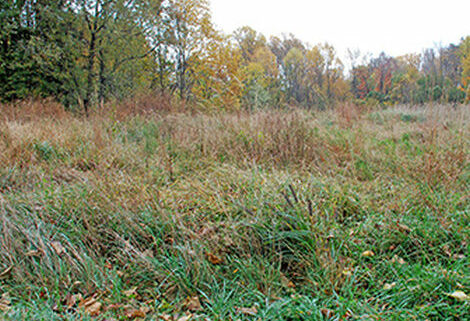
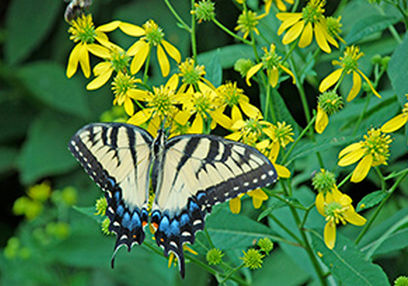
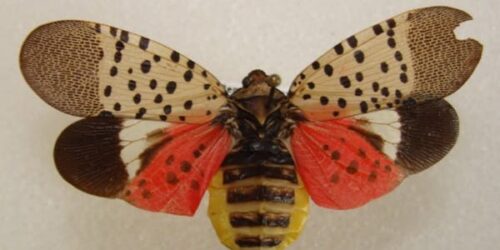
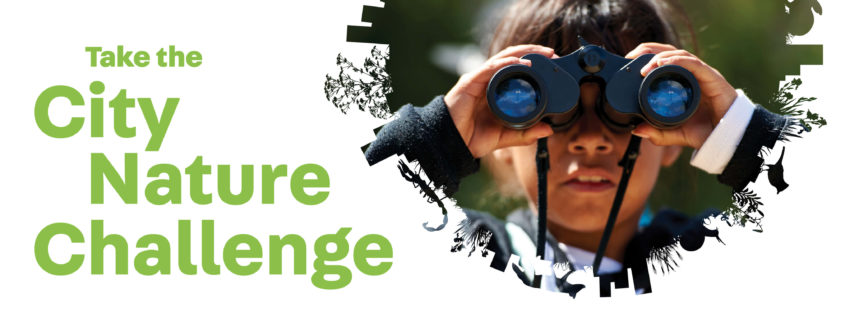
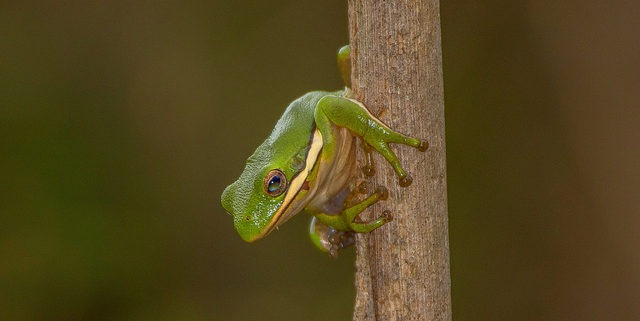
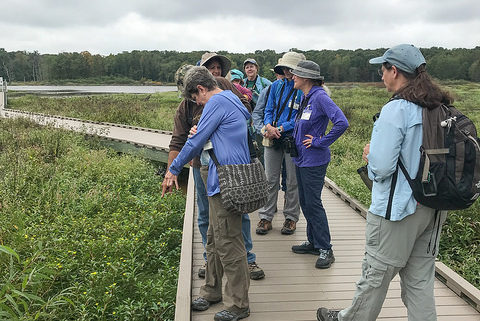
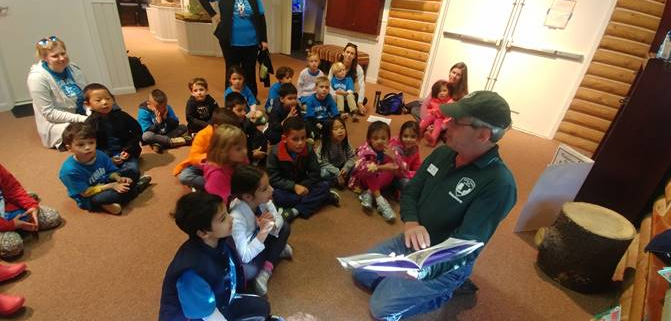
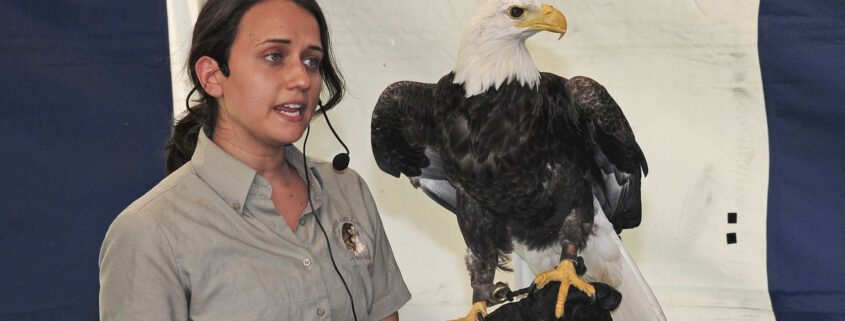
 showcase interactive exhibits. We’ll have a full day of programs, including shows on reptiles and raptors, live music, pony rides, a tent for children’s activities and more. Last year more than 4000 people attended this great event. The Friends of Mason Neck State Park covers all the expenses for the Festival, as well as providing the volunteers that help to make the event go smoothly. Would you like to help us out? Send an email to
showcase interactive exhibits. We’ll have a full day of programs, including shows on reptiles and raptors, live music, pony rides, a tent for children’s activities and more. Last year more than 4000 people attended this great event. The Friends of Mason Neck State Park covers all the expenses for the Festival, as well as providing the volunteers that help to make the event go smoothly. Would you like to help us out? Send an email to 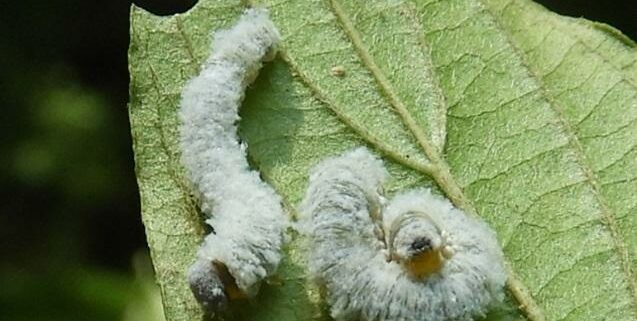
 We also observed fall webworm moth caterpillars, geometer moth caterpillars, and others that we could not identify.
We also observed fall webworm moth caterpillars, geometer moth caterpillars, and others that we could not identify.